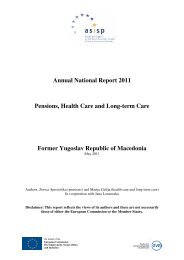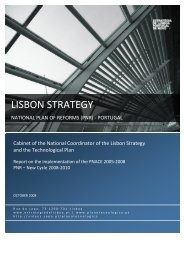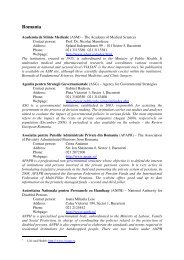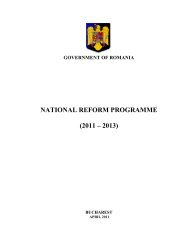National reform programme 2008-2010 Malta - European Commission
National reform programme 2008-2010 Malta - European Commission
National reform programme 2008-2010 Malta - European Commission
You also want an ePaper? Increase the reach of your titles
YUMPU automatically turns print PDFs into web optimized ePapers that Google loves.
Better regulation aims at supporting and encouraging the business community; reducing<br />
customer detriment; and, further developing an efficient, effective and improving public sector.<br />
<strong>Malta</strong>’s better regulation strategy is now focusing on business and customer “pain points” so<br />
that the strategy is prioritised. The strategy will be aligned further with Government's Vision<br />
2015 so that <strong>Malta</strong>'s strategic sectors offer the necessary minimum required regulation to<br />
facilitate as much as possible economic development.<br />
The setting up of the Better Regulation Unit (BRU) within OPM in 2006 is considered to be a<br />
step in the right direction to promote Better Regulation. The BRU is currently in the process<br />
of implementing its first Action Plan for Simplification (APS). In drawing up the first APS, the<br />
BRU has taken an intentionally inward-looking ‘top-down’ and ‘bottom-up’ approach.<br />
Government believes that the next step is to take simplification to another level and consult<br />
with the various business sectors to obtain ‘on the ground’ feedback. Furthermore, the BRU<br />
intends to review the customer care systems within the public administration and the<br />
enforcement regimes currently utilised with a view to further promote and protect the interests<br />
of the businesses, citizens and consumers.<br />
In achieving Government’s vision, that is, “fostering a culture of ‘red carpet treatment’ for<br />
businesses”, the Government of <strong>Malta</strong> has committed itself to further strengthen the BRU.<br />
The strengthening of the BRU will also permit the completion of the current APS and the<br />
launch of an updated version through an intensive, sectoral based consultation to target the<br />
key ‘pain points’ felt by businesses.<br />
Furthermore, the BRU will embark on other Better Regulation initiatives including the review<br />
of current customer care systems and enforcement regimes within the public administration<br />
and the formalisation of consultation guidelines within the public administration in line with<br />
Government’s established system of securing intensive dialogue between interested<br />
stakeholders in the decision-making process amongst others.<br />
Reduction of Administrative Burden<br />
In January <strong>2008</strong>, the Maltese Government kick-started a public consultation process with a<br />
view to establish what is the perception of administrative burdens and how these can be<br />
reduced.<br />
The Maltese Government, in collaboration with the <strong>European</strong> <strong>Commission</strong>, organised a<br />
conference in February <strong>2008</strong> with a view to raise awareness on the Administrative Burden<br />
Reduction Programme. Furthermore, this conference also acted as a follow up to the<br />
consultation process. On the basis of this consultation process, the Maltese Government has<br />
identified the following four priority areas:<br />
• Company law;<br />
• Financial services;<br />
• Food safety; and<br />
• VAT.<br />
Similar to several other <strong>European</strong> countries, <strong>Malta</strong> has chosen to adopt the Standard Cost<br />
Model (SCM) as the tool that will be used to calculate the administrative cost of burdensome<br />
information obligations.<br />
To this end, the Government has concluded a mapping exercise on the legislation in the<br />
mentioned priority areas. The exercise consisted in reviewing the legislation of each of the<br />
four areas and identifying the information obligations that originate from national legislation.<br />
In all, 49 such information obligations were identified. The Information Obligations (IOs)<br />
consist of the following:<br />
• 6 IOs concerning VAT;<br />
• 26 IOs concerning Company Law;<br />
<strong>Malta</strong> <strong>National</strong> Reform Programme <strong>2008</strong>-<strong>2010</strong> - 59 -







